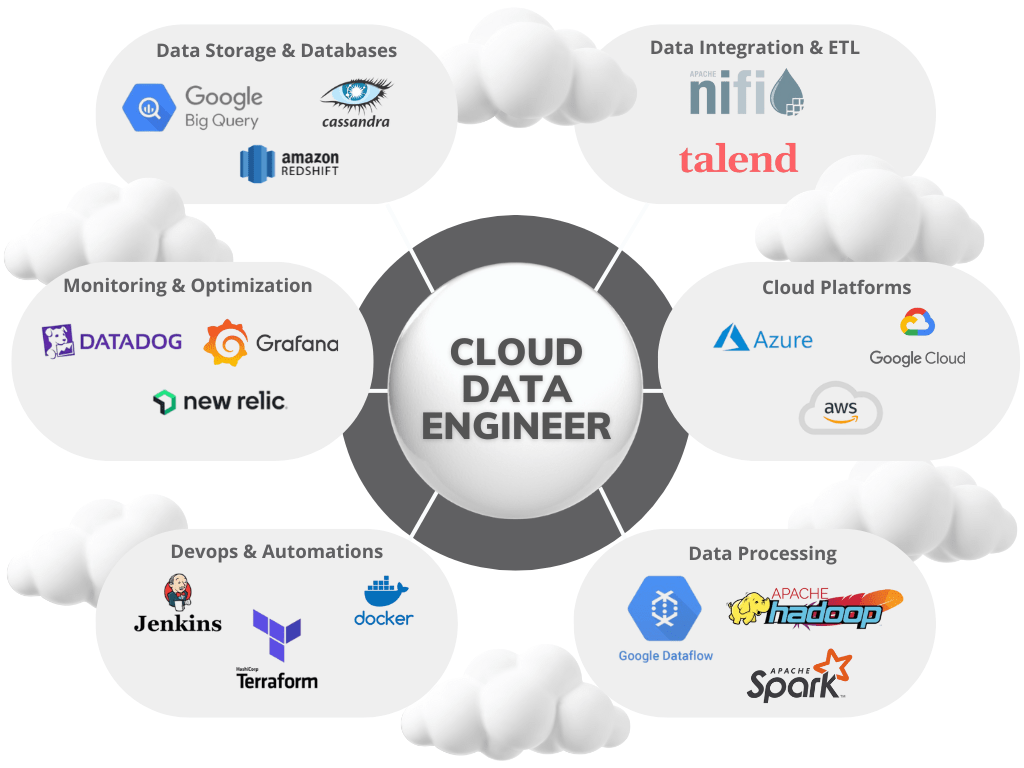How to Become a Cloud Data Engineer: 2024 Career Roadmap

Curious about the world of cloud data engineering? Wondering how data is managed seamlessly in the cloud? If you’re new to this field, you’re in the right place! Cloud data engineering is at the core of modern digital transformation, helping businesses manage, process, and analyze massive volumes of data more effectively.
In this guide, we’ll break down what cloud data engineers do, why they’re important to businesses, and how you can become one. Whether you’re an aspiring engineer or simply curious, this beginner-friendly blueprint will help you understand this fast-evolving domain.
What is Cloud Data Engineering?
Cloud data engineering is the practice of efficiently handling, properly structuring, and making use of large amounts of data on cloud platforms. Unlike the conventional approach that relies heavily on physical servers, cloud data engineering aims to build systems that scale, adapt, and remain secure over time using services from AWS, Microsoft Azure, or Google Cloud.
Cloud data engineers focus on creating strong systems for storing, retrieving, and analyzing data. They employ various tools and technologies to ensure that data is accessible, secure, and processed effectively. In essence, cloud data engineers design and build the infrastructure that powers everything from popular apps to vital business analytics and decision-making systems.
What Does a Cloud Data Engineer Do?
The role of a cloud data engineer is multifaceted, covering everything from data infrastructure design to security management. Let’s explore their key responsibilities:
-
From Creation to Adoption of Scalable Data Solutions
Cloud data engineers build systems that manage large amounts of data and can quickly retrieve, store, or analyze it. They aim to reduce bottlenecks and maintain a scalable architecture that preserves data integrity. They design storage solutions to accommodate growing data loads, using resources like AWS S3 or Google Cloud Storage.
-
Building Robust Data Pipelines
Data engineers build data pipelines to ingest, transform, and deliver data effectively. They rely on tools such as Apache Spark, AWS Glue, or Google Dataflow to maintain the smooth flow of data from source to target. This type of automation accelerates processes by making data readily available for analysis and reporting.
-
Collaborating Across Teams
Cloud data engineers collaborate with data scientists, analysts, and IT teams. They ensure that data models align with business objectives, support analytics, and comply with specific data governance policies. For instance, they might assist data scientists in training and testing machine learning models with accurate and secure datasets.
-
Optimizing Data Performance
They continuously monitor cloud data systems to detect bottlenecks, enhance performance, and minimize wait times for critical information. They enable APIs with built-in quality checks and performance optimizations to ensure efficient data consumption for applications and end users.
-
Ensuring Data Security
Security is a top priority. Cloud data engineers implement safeguards to protect against data breaches, ensure compliance with general regulations and any industry-specific rules (e.g., GDPR, HIPAA), and handle disaster recovery. This involves using tools like AWS IAM or Azure Security Center to manage access and identify security gaps.
At a senior level, cloud data engineers also mentor junior engineers, define best practices for end-to-end data lifecycle management, and drive innovation within the data engineering team.
What are the Types of Cloud Data Engineers?
Cloud data engineering offers diverse career paths, each focusing on different aspects of data management in the cloud. Here are some key roles:
-
Infrastructure Engineer
These engineers design and manage the underlying cloud infrastructure. They ensure systems are reliable, scalable, and capable of handling large datasets. For example, they might configure AWS EC2 instances or set up Azure Virtual Machines to support data storage and processing.
-
Data Integration Engineer
Data integration engineers focus on bringing data from various sources into a unified cloud environment. They use tools like ETL pipelines and Apache NiFi to ensure data flows seamlessly and is ready for analysis.
-
Cloud Data Warehouse Engineer
Engineers in this domain design and maintain cloud-based data warehouses like Amazon Redshift, Google BigQuery, etc. They organize their information in order to enable it to scale effectively for query and reporting at a greater rate, allowing businesses to make decisions based on real-time insights from the modern data stack.
-
Big Data Cloud Engineer
Big data engineers build and manage a usable platform for large datasets compatible with big data tools like Hadoop or Apache Spark. They support various use cases such as analytics, reporting, and decision-making, where large-scale data processing is required either in batch mode or in real-time.
-
Cloud Data Security Engineer
These engineers specialize in cloud data protection. They take security measures, check for breaches, and adhere to data protection laws. They leverage tools like AWS KMS and Azure Key Vault to encrypt PII as much as possible.
-
ML Data Engineer
Machine learning engineers operate at the intersection of data engineering and machine learning, preparing training pipelines for ML models and managing the operations needed to deploy trained models into production systems. They use tools like TensorFlow and AWS SageMaker to manage ML workflows.
Essential Skills to Become a Cloud Data Engineer
If you’re aiming to become a cloud data engineer, mastering the right skills is crucial. Here’s what you need:
-
Knowledge of Cloud Platforms
A good understanding of cloud platforms (AWS, Azure, or Google Cloud) is necessary. Since these platforms form the heart of cloud data engineering, you must be comfortable with services like AWS S3, Azure Blob Storage, or Google Cloud BigQuery.
-
Data Management and Security
The most important skill today is the ability to gather accurate data for future use. To ensure data integrity and confidentiality in the cloud, you need a strong grasp of various security compliance practices, encryption, and appropriate access policies.
-
Networking Basics
To interface between networks and cloud services, a solid foundation in networking basics is required. This includes an understanding of virtual networking, VPNs, and firewalls to ensure secure and efficient data flow.
-
Programming Proficiency
In cloud data engineering, programming is essential. Building data pipelines, automating workflows, or developing cloud-based solutions are commonly done using languages like Python, Java, Go, and SQL.
-
Operating Systems and Virtualization
A working knowledge of Linux and Windows is required to manage cloud infrastructure. Virtualization tools like Docker and Kubernetes are essential for deploying containerized applications and managing cloud resources.
Do You Need a Degree to Become a Cloud Data Engineer?
While a bachelor’s degree in computer science, information technology, or a related field can be beneficial, it’s not always required to start your cloud data engineering career. Here are alternative paths:
- Certifications — There are several great options in this domain, like AWS Certified Solutions Architect or Google Associate Cloud Engineer, which offer a broad view of the technologies used.
- Boot Camps & Online Courses — Cloud-focused boot camps offer hands-on training, enabling you to learn practical skills within a short period.
- Self-Study — There are plenty of guides, tutorials, and open-source projects that you can use to learn independently.
While degrees can be helpful in securing more senior roles, most companies prioritize hands-on experience, practical skills, and certifications that demonstrate your ability to build cloud data engineering pipelines.
How to Start Your Cloud Data Engineering Journey
Here’s a step-by-step roadmap to becoming a successful cloud data engineer:
- Understand the Basics: Acquaint yourself with fundamental concepts of cloud computing and data engineering through online courses or tutorials.
- Select a Cloud Platform: Master one of the major platforms like AWS, Azure, or Google Cloud to build expertise.
- Get into Programming: Learn programming languages like Python or SQL to create data pipelines and automate workflows.
- Get Certified: Earning certifications like AWS Solutions Architect or Azure Data Engineer Associate can give you a competitive edge.
- Gain Hands-On Experience: Internships, freelance projects, or personal cloud projects can provide practical exposure.
- Build a Portfolio: Showcase your cloud projects, including data pipelines, storage solutions, and analytics tools.
- Stay Updated: Keep learning by following industry blogs, joining webinars, and participating in cloud-focused events.
Which Tools and Software Are Essential for Cloud Data Engineers?

Here’s a closer look at the tools that cloud data engineers rely on:
Data Integration and ETL Tools
- Apache NiFi: An open-source tool that helps automate data flow between systems.
- Talend: Offers comprehensive data integration and transformation capabilities, with a user-friendly interface for building data pipelines.
Cloud Platforms
- AWS: Offers a broad range of services for building cloud-based data solutions.
- Microsoft Azure: Provides flexible tools for managing, deploying, and scaling applications globally.
- Google Cloud Platform (GCP): A suite of cloud computing services built on Google’s infrastructure.
Data Processing Tools
- Apache Spark: A popular tool for fast, distributed data processing.
- Apache Hadoop: A framework for processing large datasets across clusters of computers.
- Google Dataflow: Provides real-time and batch data processing capabilities.
DevOps and Automation Tools
- Jenkins: Helps automate building, testing, and deploying software.
- Docker: Containerizes applications for consistent performance across environments.
- Terraform: Allows for managing infrastructure as code, making deployments easier and more reliable.
Monitoring and Optimization Tools
- Datadog: Monitors cloud applications and infrastructure in real time.
- New Relic: Offers insights into application performance.
- Grafana: Provides visualization of system metrics to help optimize performance.
Data Storage and Databases
- Amazon Redshift: A managed data warehouse service designed for large-scale data analytics.
- Google BigQuery: A serverless, cost-effective, and highly scalable data warehouse.
- Cassandra: A NoSQL database that handles large volumes of data across many servers.
Is Cloud Data Engineering a High-Paying Career?
Yes, cloud data engineering is not only a rewarding career but also a highly lucrative one. As companies continue to adopt cloud solutions, the demand for skilled professionals is on the rise. According to recent data, cloud data engineers in the United States earn between $92,000 and $126,000 per year, depending on experience, location, and specialization.
The role offers long-term stability, opportunities for career growth, and the potential to work on cutting-edge technologies like big data and machine learning. With the continuous evolution of cloud computing, pursuing a career in cloud data engineering can provide both job security and exciting challenges.
Ready to Become a Cloud Data Engineer?
Cloud data engineering presents a dynamic, fast-growing career path filled with opportunities for growth, innovation, and competitive salaries. Whether you’re a tech enthusiast or an IT professional looking to upskill, this field offers an excellent chance to make an impact in the world of data and cloud computing.
Need assistance with your cloud data engineering and data science projects? Contact KaarTech for expert guidance. For any related queries, feel free to reach out to our Data Engineering and Science team, also we are available to support you on all your data engineering needs.
FAQ’s
1. What does a Cloud Data Engineer do?
A Cloud Data Engineer builds and manages cloud-based systems for data storage, processing, and analysis, ensuring data integrity, security, and scalability. They work with tools like AWS, Apache Spark, and Google Cloud to automate data flows and support business analytics.
2. Do you need a degree to become a Cloud Data Engineer?
While a degree can be helpful, it’s not mandatory. Certifications, boot camps, and hands-on experience often hold more weight in this field. Practical skills and real-world project experience are highly valued by employers.
3. What skills are essential for Cloud Data Engineers?
Key skills include knowledge of cloud platforms (e.g., AWS, Azure), programming (e.g., Python, SQL), data management, security, and networking basics. Additionally, expertise in tools like Docker, Terraform, and Jenkins can enhance your effectiveness in managing cloud infrastructure.
4. Is Cloud Data Engineering a high-paying career?
Yes, they can earn between $92,000 and $126,000 annually in the U.S., depending on experience, location, and specialization. The demand for skilled professionals is growing, providing both job security and career advancement opportunities.
